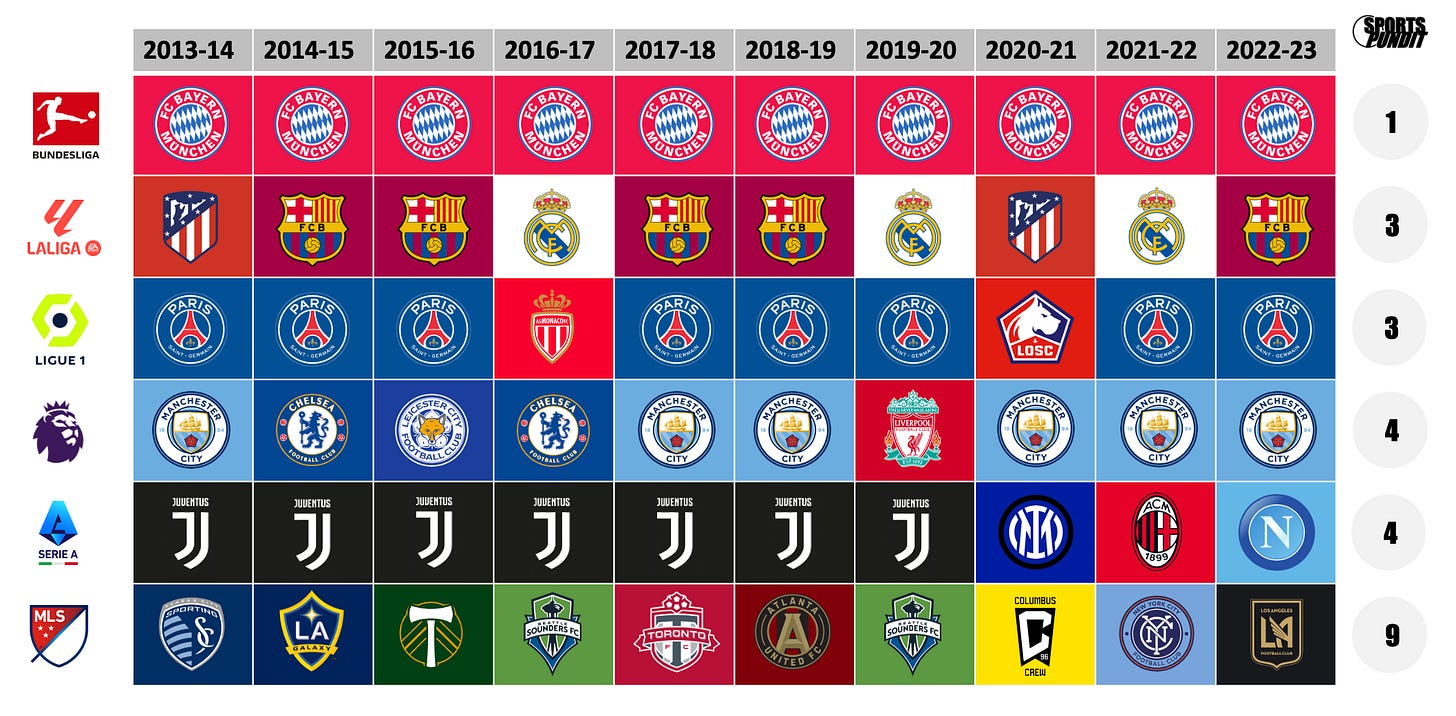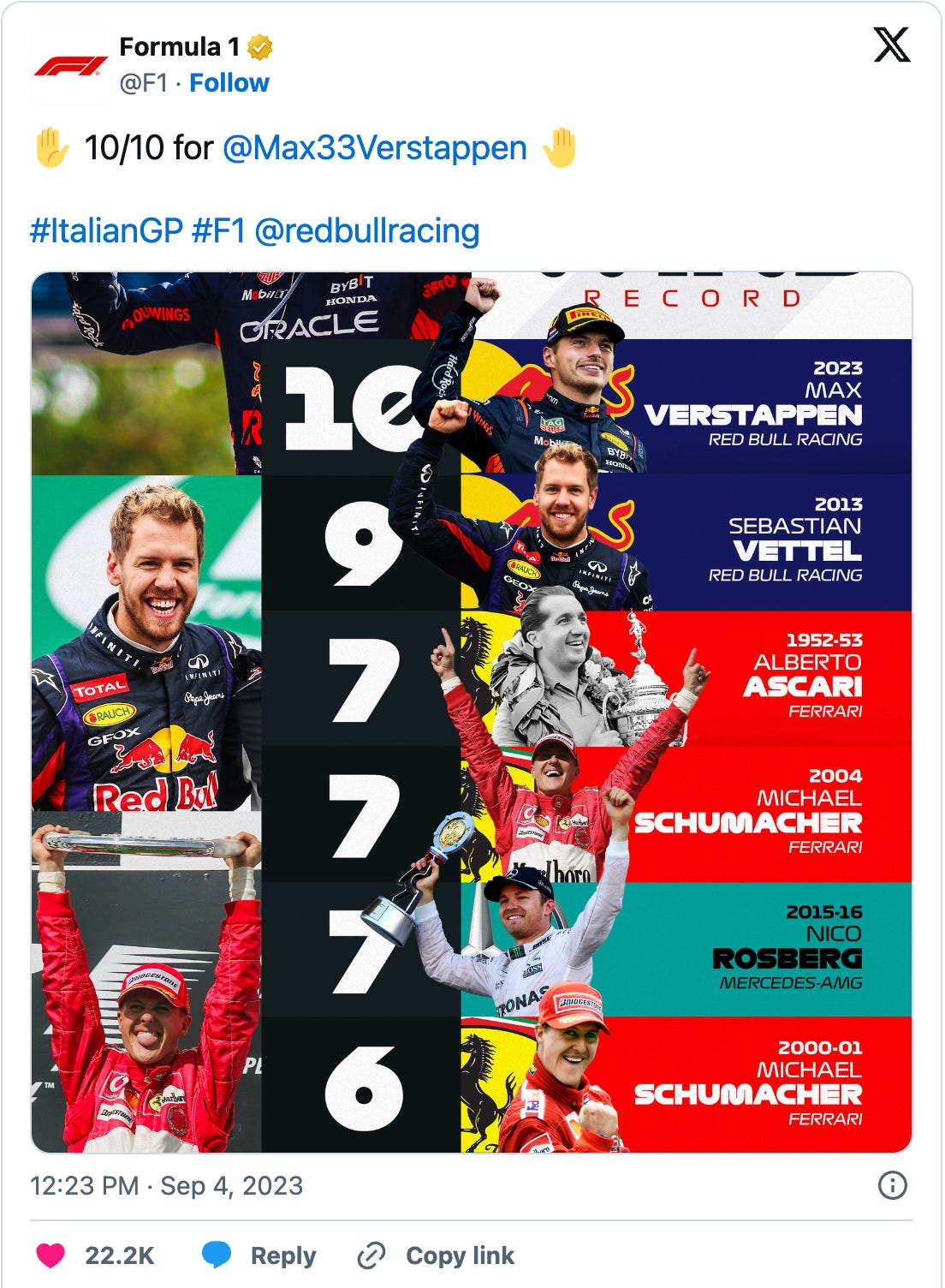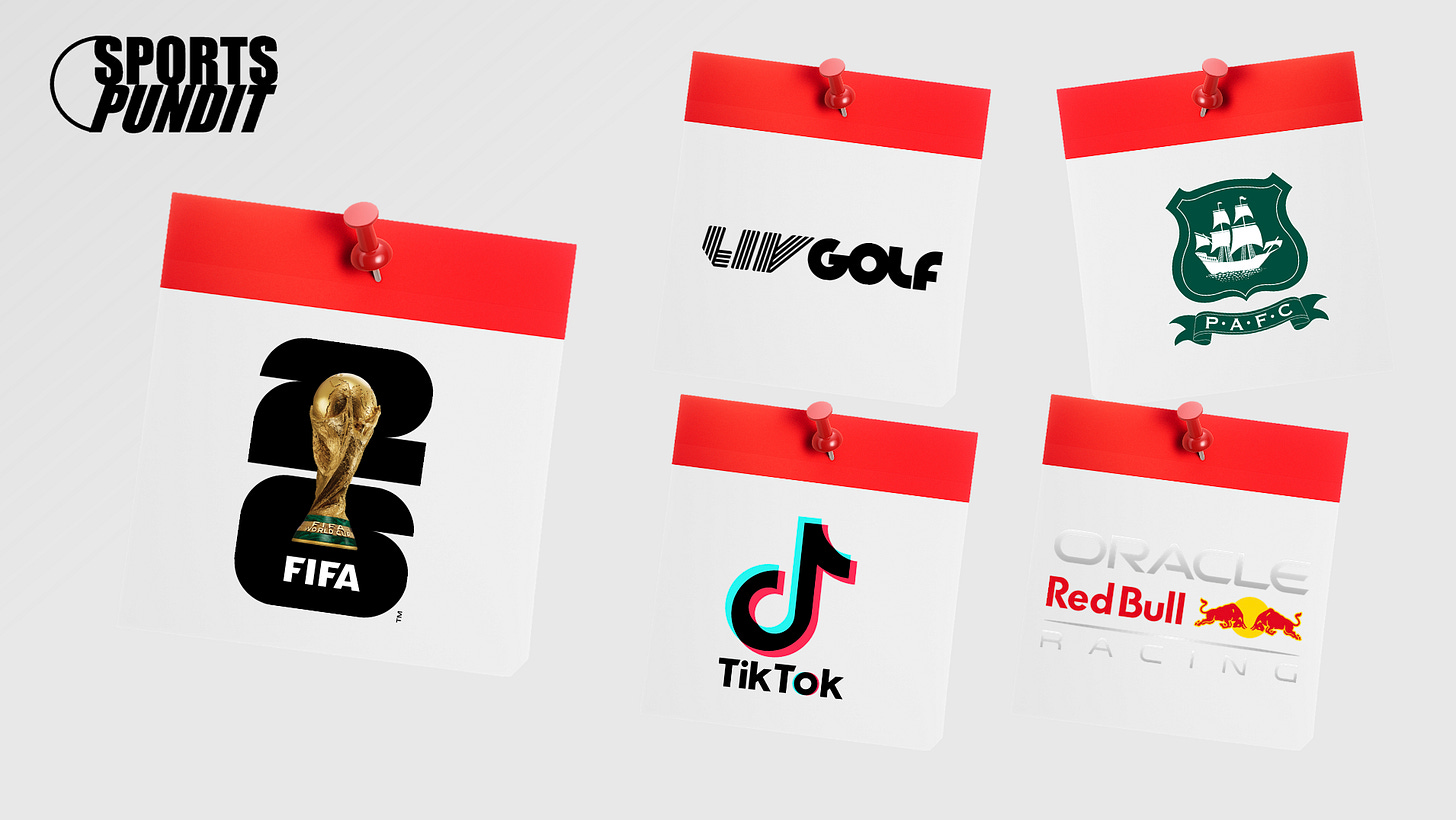Balancing Act: Messi, Verstappen and Dealing with Dominance ⚖️
Messi's arrival in the US has changed the fortunes of Inter Miami CF at the cost of disrupting the competitive balance of the MLS. The question is, does that really matter?
Not yet a subscriber? Join 1000+ sports business leaders, from the PFL to the Premier League, that read Sports Pundit every week to get impactful industry insights.
BIG IDEA
In July, the football world witnessed a seismic shift as its greatest player of all time, Lionel Messi, made his historic, and well-reported, move to Major League Soccer (MLS).
The impact of Messi's arrival at Inter Miami CF has been nothing short of extraordinary. His impact both on and off-the-field has elevated the league's global profile and captured the imaginations of fans worldwide.
Having languished at the foot of the Eastern Conference table upon the Argentinian’s arrival, the club has also witnessed a significant change of fortunes.
Their valuation is touted to soar to $1.5 billion, and they are unbeaten in all 11 of their encounters post-Messi’s arrival - winning their first ever Leagues Cup (10-9 on penalties vs Nashville) and beating last year’s MLS champions LAFC 3-1 in their most recent match.
The excitement that he has brought, as showcased by the inflated cost of tickets for matches, as well as the hoards of celebrity fans suddenly arriving to watch Miami’s games, has given the league an almighty boost, but it also has defied a logic within sport - a logic which claims that competitive balance is what matters most.
Competitive balance is essentially a measure of league parity.
It is defined as the condition in which each team in a particular contest has the same odds of winning and, therefore, winning is left completely up to variable chance.
Typically, particularly in the US, league commissioners have strived to increase competitive balance in their leagues through the implementation of salary caps, revenue sharing, and the draft system, as it is thought to consistently keep players and fans engaged over the course of entire seasons.
As a result of these sorts of practices, the MLS, unlike many of the top football leagues in Europe, has managed to retain an impressive level of competitive balance.
In the past 10 years, the MLS has been won by nine different teams. Comparatively, the Bundesliga has had just one champion in this time period, La Liga and Ligue 1 have had three, and the Premier League and Serie A have had four different winners.
Of course, at 36 years old, it’s unlikely Messi’s arrival is going to usher in a decade of Bayern Munich-esq dominance for Inter Miami, but, with exceptions made by the league to bring him and some of his former Barca teammates to South Florida, it could arguably create an imbalance over at least the next 2, 3, or 4 years.
The question is, does that matter?
European football’s financial fair play (FFP) rules have made a limited impact on preventing the top teams in Europe from attracting and hoarding copious amounts of footballing talent yet the top teams each still remain incredibly popular, watched by millions of fans the world over.
If you look at Formula 1 and the recent criticism surrounding the dominance of Red Bull Racing’s Max Verstappen1, who has won all of the last 10 Grand Prixs, you’d perhaps be more inclined to say it matters more.
However, though viewership figures may have dropped off slightly from last year's numbers due to the predictability of the outcome, interest in the sport and the physical attendances at each Grand Prix remain very strong.
Even in other US sports where competitive balance restrictions are theoretically in place, such as in the NFL and NBA, we have still seen dynasties being formed by teams such as the New England Patriots and the Golden State Warriors - and the popularity of these leagues (and teams) has risen as a result.
This, then, all points to something else being the driving force behind fandom.
According to research from Baylor University professor Kirk Wakefield on Major League Baseball (MLB) attendance, this ‘something else’ was found to be stadium quality and, unsurprisingly, star players.
Taking this logic then back to the MLS, even if Messi does continue to dominate, the chances are that his star power will continue to massively outweigh any attraction that the league was able to produce previously through the balancing of competition.
Ultimately, his draw is reflective of the power held by the individual in today’s society - and the fact that people gravitate to people and athletes, not clubs and brands.
And for Formula 1, love him or hate him, it’s not about stopping Verstappen from winning with rule changes but instead, it’s about finding a way to illustrate just how good he is and why it is that no one can get close.
*It should be noted this ‘boring’ narrative is strongest in the UK, home to both Mercedes drivers, Lewis Hamilton and George Russell.
Not yet a subscriber? Join 1000+ sports business leaders, from the PFL to Premier League, that read Sports Pundit every week to get impactful industry insights.
JOB BOARD
Manager, Host City Rights Management - FIFA World Cup 2026 (Miami, US)
Strategy & Initiatives Leader (Europe) - TikTok LIVE (London, UK)
Head of Commercial Operations - Plymouth Argyle (Plymouth, UK)
Senior Internal Communications Manager - Red Bull Racing and Technology (Milton Keynes, UK)
Senior Digital Channels Manager - LIV Golf (New York, US)
Do you have a job you’d like to promote to the amazing readers of this newsletter? Drop me a note at andy@sportspundit.org









